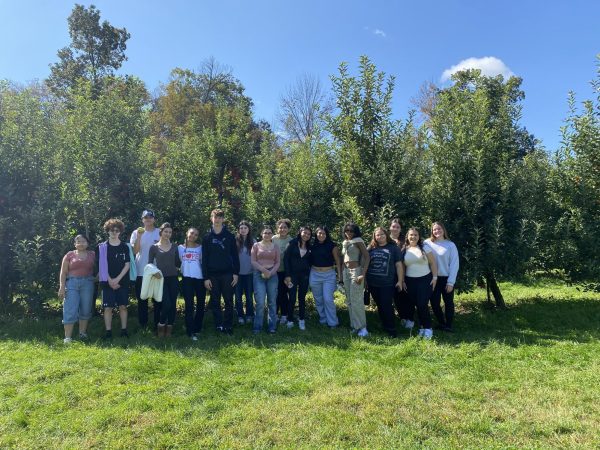Environmental Club Feature: Pollution in New Jersey: how it affects us and our environment
This year the Environmental Club is contributing to the Cat’s Eye View with stories that impact our earth and our lives.
What is air pollution, and how does it affect us?
Air pollution can come from power plants, factories, motor vehicles, and many other sources. The pollutants that contribute to air pollution are ozone, carbon monoxide, lead, particulate matter, nitrogen dioxide, sulfur dioxide, and various other chemicals referred to as “air toxics.” The impact of air pollution depends on the amount of pollution in the air and a person’s health status. Exposure to high levels of air pollution can cause numerous effects, from eye irritation and runny nose to cancer and birth defects. Air pollution can also cause heart and lung disease, and brain and nerve damage. The New Jersey Department of Environmental Protection states, “Approximately 620,000 New Jersey residents have been diagnosed with asthma, which can make them more sensitive to air pollution. In general, children and the elderly are also more sensitive to air pollution.” The American Lung Association released its 2020 State of the Air report showing that the state of New Jersey continues to have some of the most polluted air in the nation. “… During the current health emergency this is even more important because a recent Harvard study linked coronavirus risk to air pollution,” said Jeff Tittel, Director of the New Jersey Sierra Club. She additionally stated, “In New Jersey, asthma attacks from ozone kill 100 children every year. During this public health emergency, if at-risk people are infected with the coronavirus the impacts of air pollution can be deadly. New Jersey needs to move quickly to reduce our air pollution.”
What works in reducing the health risks of pollution?
Studies showed that a decrease in the concentration of fine particulates lowers the risk of all-cause mortality, lung cancer, and death from cardiovascular disease. The effects of less air pollution are very significant. America’s Health rankings state, “The Clean Air Act prevented an estimated 130,000 heart attacks, 1.7 million asthma attacks, and 13 million lost workdays between 1990 and 2010 and by 2020, an estimated 230,000 adult premature deaths and 280 infant deaths will be prevented.” Pollution still very much remains high in some areas. Individuals can reduce their contribution to air pollution by decreasing fossil fuel consumption.
Pollution in wildlife
People are continuously throwing away plastic items into the environment, the most common being polystyrene foam, also known as styrofoam, which never completely breaks down. For decades, styrofoam has been one of the worst forms of plastic pollution. This plastic breaks into pieces easily, but it lingers in the environment even in tiny particles. It is easy for animals to mistake plastic waste for food. Environment New Jersey states, “Scientists have found plastic fragments in literally hundreds of species, including 86% of all sea turtle species, 44% of all seabird species, and 43% of all marine mammal species.” Consuming plastic waste is often a death risk for animals. They can starve when they swallow too much plastic that they can’t digest. Environment New Jersey further states, “When animals ingest plastic waste, it can block their digestive tracts. As a result, they starve.” The plastic animals eat can contain toxic chemicals, and this harms their health, including the people that consume the animals.
How New Jersey is taking action
Described by the New Jersey Department of Environmental Protection, the Clean Air Act requires the Environmental Protection Agency (USEPA) to establish regulations that reduce and control the volume of pollutants discharged into the air as an effort to protect public health. The act additionally instructs the development of National Ambient Air Quality Standards (NAAQS). NJDEP states, “The Act requires states to enforce these regulations to ensure that all Americans have the same health and environmental protection.” The New Jersey Air Pollution Control Act eliminated air pollution emissions from power plants, factories, and many more sources. New Jersey has made great efforts in reducing the pollution in its state, but ozone and other air toxics, and fine particulates remain a public health concern.
How you can protect the environment during coronavirus
The Ottawa Riverkeeper informs that people can contribute to eliminating pollution by the following:
Eliminate plastic water bottles.
Support your local businesses and reduce your carbon footprint by buying local products.
Reducing your meat consumption to protect the planet and be more healthy.
Plant native or acclimatized plants in your yard to promote biodiversity.
Reduce your electric bill and your energy consumption by unplugging your unused electronics.
Improve your home infrastructure by diverting rainwater away from our storm and sewer systems.
Review the chemicals in your cleaning products in your home to protect our waterways.
Avoid clogging our sewer systems by not flushing disinfecting wipes (even those labeled as flushable) down the toilet.
Avoid idling your car for more than 60 seconds.
Donate to, volunteer for, or become a member of a local environmental organization.
Sources:
- https://www.ottawariverkeeper.ca/10-ways-to-protect-the-environment-during-the-covid-19-pandemic/
- https://environmentnewjersey.org/feature/nje/wildlife-over-waste
- https://www.americashealthrankings.org/explore/annual/measure/air/state/NJ
- https://www.sierraclub.org/new-jersey/blog/2020/04/new-air-report-shows-nj-still-f-worst-air-quality-nation#:~:text=Chapter%20E%2DNewsletter-,New%20Air%20Report%20Shows%20NJ%20Still%20an%20%E2%80%9CF%E2%80%9D%20%2D,Worst%20Air%20Quality%20in%20Nation&text=The%20American%20Lung%20Association%20released,pollution%2C%20also%20known%20as%20smog.
- https://www.state.nj.us/dep/ej/camden/docs/getknowairpoll.pdf
Julia has started tenth grade this year and is delighted to be involved in the Cat’s Eye View. Julia’s all-time love is writing literature pieces...












